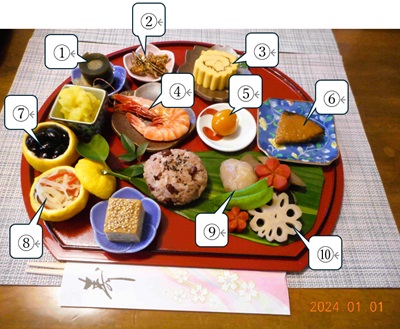Blogs edited and submitted by Chiho Kamioka
JOI Support staff and manager.
Osechi Ryori Cuisine Meanings
New Year Food Japan
In this blog by Japanese online teacher, Yamamoto sensei, we have a free Japanese reading and listening lesson for you. You can practice reading the Kanji and learn new Japanese vocabulary.
Also learn more about this iconic food in Japanese culture. What are the meanings of each food ? Yamamoto sensei explains!
おせち料理
Osechi Ryori

By YAMAMOTO Hiroshi
明けましておめでとうございます。 今年もよろしくお願いいたします。
今回はおせち料理のお話をします。
おせち料理とは、お正月に食べるお祝いの料理のことです。 最近は有名料理店の豪華なおせち料理をネットで注文する人が増えていますが、昔はほとんど各家庭で手作りされていました。年末にたくさん作っておき、お正月は料理を作らずに、ゆっくりと家族で過ごす人が多かったと思います。
元々は収獲を感謝して神様へお供えする料理でしたが、江戸時代に庶民の正月のご馳走料理として広まりました。このおせち料理は20~30種類あると言われていますが、それぞれの料理に願いごとの意味があります。
今日は我が家の家内が作ったおせち料理の写真を基に、それを紹介したいと思います。なお、下の説明文の番号と写真の番号が一緒なので、見比べてください。

①「こんぶまき」という海藻料理:「喜ぶ」と発音が似ていることから、「良いことがたくさん起こりますように」との願いです。
②「ごまめ」という魚料理:昔 小魚を砕いて肥料として使ったことから「農作物が良く出来ますように」との願いです。
③「だて巻」という卵料理:昔の本は巻物の形をしていて、それに似ていることから「知識が増えますように」との願いです。
④「エビ料理」:エビの姿が丸く曲がっていることから、「腰が曲がるまで長生きできますように」との願いです。
⑤「きんかん」という果物料理:きんかんは漢字で金柑と書き、お金を連想させるので、「お金がたくさん貯まりますように」との願いです。
⑥「ぶり照り焼き」という魚料理:この魚は大きくなると呼び名がだんだん変わっていきます。そのため「成功して出世しますように」との願いです。
⑦「黒まめ」という豆料理:面倒がらずに物事に熱心に取り組むことを「まめ」といいます。そのことから「まめに働けますように」との願いです。
⑧「紅白なます」という野菜料理:だいこんとニンジンで作る料理です。両方とも土の中に根を張ることから「家族の土台がしっかり安定しますように」との願いです。
⑨「にしめ」という煮物料理:様々な食材を一緒に煮ていることから、「家族一緒に仲良く結ばれますように」との願いです。
⑩「酢れんこん」という野菜料理:れんこんは中に孔が多く空いていて、切るとその先をのぞくことができます。このことから「将来を明るく見通せますように」との願いです。
いかがでしたか。皆さんが食べてかなえたい願いは何ですか。
今年も、皆様にとりまして、良い1年となりますように。
To listen to this blog, please watch our Youtube video.
おせち料理(りょうり)
明(あ)けましておめでとうございます。 今年(ことし)もよろしくお願(ねが)いいたします。
今回はおせち料理(りょうり)のお話(はなし)をします。
おせち料理(りょうり)とは、お正月(しょうがつ)に食(た)べるお祝(いわ)いの料理(りょうり)のことです。 最近(さいきん)は有名(ゆうめい)料理店(りょうりてん)の豪華(ごうか)なおせち料理(りょうり)をネットで注文(ちゅうもん)する人(ひと)が増(ふ)えていますが、昔(むかし)はほとんど各家庭(かくかてい)で手作(てづく)りされていました。年末(ねんまつ)にたくさん作(つく)っておき、お正月(しょうがつ)は料理(りょうり)を作(つく)らずに、ゆっくりと家族(かぞく)で過(す)ごす人(ひと)が多(おお)かったと思(おも)います。
元々(もともと)は収穫(しゅうかく)を感謝(かんしゃ)して神様(かみさま)へお供(そな)えする料理(りょうり)でしたが、江戸時代(えどじだい)に庶民(しょみん)の正月(しょうがつ)のご馳走料理(ちそうりょうり)として広(ひろ)まりました。このおせち料理(りょうり)は20~30種類(しゅるい)あると言(い)われていますが、それぞれの料理(りょうり)に願(ねが)いごとの意味(いみ)があります。
今日(きょう)は我(わ)が家(や)の家内(かない)が作(つく)ったおせち料理(りょうり)の写真(しゃしん)を基(もと)に、それを紹介(しょうかい)したいと思(おも)います。なお、下(した)の説明文(せつめいぶん)の番号(ばんごう)と写真(しゃしん)の番号(ばんごう)が一緒(いっしょ)なので、見比(みくら)べてください。
①「こんぶまき」という海藻料理(かいそうりょうり):「喜(よろこ)ぶ」と発音(はつおん)が似(に)ていることから、「良(よ)いことがたくさん起(お)こりますように」との願(ねが)いです。
②「ごまめ」という魚料理(さかなりょうり):昔(むかし) 小魚(こざかな)を砕(くだ)いて肥料(ひりょう)として使(つか)ったことから「農作物(のうさくもつ)が良(よ)く出来(でき)ますように」との願(ねが)いです。
③「だて巻(ま)き」という卵料理(たまごりょうり):昔(むかし)の本(ほん)は巻物(まきもの)の形(かたち)をしていて、それに似(に)ていることから「知識(ちしき)が増(ふ)えますように」との願(ねが)いです。
④「エビ料理(りょうり)」:エビの姿(すがた)が丸(まる)く曲(ま)がっていることから、「腰(こし)が曲(ま)がるまで長生(ながい)きできますように」との願(ねが)いです。
⑤「きんかん」という果物料理(くだものりょうり):きんかんは漢字(かんじ)で金柑(きんかん)と書(か)き、お金(かね)を連想(れんそう)させるので、「お金(かね)がたくさん貯(た)まりますように」との願(ねが)いです。
⑥「ぶり照(て)り焼(や)き」という魚料理(さかなりょうり):この魚(さかな)は大(おお)きくなると呼(よ)び名(な)がだんだん変(か)わっていきます。そのため「成功(せいこう)して出世(しゅっせ)しますように」との願(ねが)いです。
⑦「黒(くろ)まめ」という豆料理(まめりょうり):面倒(めんどう)がらずに物事(ものごと)に熱心(ねっしん)に取(と)り組(く)むことを「まめ」といいます。そのことから「まめに働(はたら)けますように」との願(ねが)いです。
⑧「紅白(こうはく)なます」という野菜料理(やさいりょうり):だいこんとニンジンで作(つく)る料理(りょうり)です。両方(りょうほう)とも土(つち)の中(なか)に根(ね)を張(は)ることから「家族(かぞく)の土台(どだい)がしっかり安定(あんてい)しますように」との願(ねが)いです。
⑨「にしめ」という煮物料理(にものりょうり):様々(さまざま)な食材(しょくざい)を一緒(いっしょ)に煮(に)ていることから、「家族(かぞく)一緒(いっしょ)に仲良(なかよ)く結(むす)ばれますように」との願(ねが)いです。
⑩「酢(す)れんこん」という野菜料理(やさいりょうり):れんこんは中(なか)に孔(あな)が多(おお)く空(あ)いていて、切(き)るとその先(さき)をのぞくことができます。このことから「将来(しょうらい)を明(あか)るく見通(みとお)せますように」との願(ねが)いです。
いかがでしたか。 皆(みな)さんが食(た)べてかなえたい願(ねが)いは何(なん)ですか。
今年(ことし)も、皆様(みなさま)にとりまして、良(よ)い1年(いちねん)となりますように。
Osechi ryori
Happy New Year! We look forward to working with you again this year.
In this time's Japanese lesson blog we will talk about Osechi ryori cuisine.
Osechi ryori is a festive dish eaten during the New Year's holiday.
Recently, more and more people are ordering luxurious New Year's dishes from famous restaurants online, but in the past, almost all dishes were homemade by each household. Many people made a lot of dishes at the end of the year and spent a relaxing time with their families without cooking during the New Year's holiday.
Originally it was a dish offered to the gods in thanksgiving for the harvest, but it became popular as a New Year's feast for the common people during the Edo period (1603-1867). It is said that there are 20 to 30 types of food in this Osechi dish, and each food represents its own meaning of wishes that are granted to the family by eating them.
Today I would like to introduce it based on the photos of Osechi ryori dishes my wife made. Note that the numbers in the description below are the same as the numbers in the photos, so please compare them.
1. Seaweed dish called “Konbumaki”: because of its similarity in pronunciation to “rejoice - yorokobu,” it represents a wish that many good things will happen to you.
2. A fish dish called “Gomame”: a wish for good crops, since small fish were crushed and used as fertilizer in the old days.
3. An egg dish called “datemaki”: ancient books were in the shape of a scroll, and this food represents a wish meaning “may your knowledge increase” because of its resemblance to a scroll.
4. Shrimp cuisine": The shrimp's rounded, curved shape represents a wish that one may live a long life until one's waist bends.
5. Fruit dish called “Kumquat or Kinkan”: Kinkan is 金柑 when written “ in Chinese Kanji characters, which reminds people of money, and the wish is that people will save a lot of money.
6. A fish dish called “Buri Teriyaki”: As this fish gets bigger, its name gradually changes. The name “Buri Teriyaki” is a wish for success and success in life.
7. A bean dish called “Kuro-mame”: represents a wish to work diligently on things instead of finding them troublesome. This type of diligent attitude is called “Mame”. From this, the wish is “May you work diligently".
8. "Kohaku Namasu” is a vegetable dish made of radish and carrot. Since both have roots in the soil, it is a wish that “the foundation of the family will be firmly stabilized.
9. "Nisshime” is a simmered dish: various ingredients are simmered together, and the wish is that the family will be united together and get along well.
10. A vegetable dish called “Vinegared lotus root/ Surenkon”: The lotus root has many holes in it, and when cut, you can see through them. This is a wish for a bright future.
What do you think? What wish would you like to fulfill?
I wish you all a happy new year.
おせち料理:traditional food eaten during the New Year's holidays
豪華: luxurious
手作り:handmade
収獲:harvest
供える:to offer
江戸時代:Edo period (1603-1868)
庶民:common people
ご馳走: feast
家内:(my) wife
海藻:seaweed
砕く:to break (into pieces)
肥料:fertilizer
巻物:rolled book
エビ: shrimp
出世:success in life
根:root (of a plant)
張る:grow (send down)
土台:foundation
煮物: food cooked by boiling or stewing
食材:foodstuff
酢(す):vinegar
孔:hole
のぞく:to peek (through a keyhole, gap, etc.)
見通す: to foresee
かなえる:to grant (request, wish)

I started teaching Japanese to technical intern trainees and internship students, and since 2019, online Japanese instructor at JOI.
My main focus is on Business Japanese and JLPT grammar (N1,N2.N3) in particular. I am also available for short-term private lessons to improve your business Japanese skills before joining a company, taking an assignment, or changing jobs on your requested schedule.
I worked for a major machine manufacturer for about 40 years. During that time, I was assigned to various departments such as factories, trading, R&D, sales, general affairs, accounting, and auditing. With these experiences, I believe I can provide you with practical assistance in various situations when you are doing business in Japanese.

